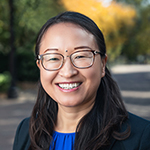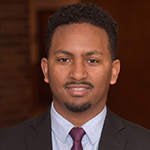Center for African Studies Names Loogman Grant Winners
Assistant Education Professor Dr. Xia Chao and Assistant Law Professor Aman Gebru have been named the 2021 Rev. Alphons Loogman, C.S.Sp., Faculty Research Grant awardees by the Center for African Studies.

Established in 2014, the Loogman grant is a University-wide internal funding opportunity open to all disciplines. It was developed to support scholarly research and creative endeavors that reflect Duquesne’s historic commitment to a closer relationship with the nations and people of Africa.
Chao was awarded a $6,500 Loogman grant for her submission Transnational Grassroots Multilingualism in African Town in Guangzhou: A Visual Ethnography. Chao describes it as a visual study built on transnationalism, language and literacy as a social practice theory. “It aims to examine the multilingual practices and perceptions of African migrants at the intersection of their transnational experiences and identities in the context of Africa Town in Guangzhou, China,” Chao wrote in her abstract submission.
Chao has been a faculty member in the Department of Instruction and Leadership in Education since 2015. Her research centers on investigating everyday language and literacy practices in schools and immigrant, refugee-background and indigenous families and communities, as well as the preparation of teachers to teach multilingual learners.

Gebru was awarded a $6,500 Loogman grant for his submission Biopiracy and Biodiversity Protection: The Case of Teff Flour Patents. Biopiracy is a widely criticized process of exploiting and patenting biological products and processes without authorization from the provider of genetic resources and traditional knowledge. In his abstract submission, Gebru describes that he will address biopiracy through the example of the Teff flour patents issued in the Netherlands and their impact on the Ethiopian people, for whom Teff is a food staple and against whom these patents could be enforced.
“The case study exemplifies numerous instances of biopiracy where the patent applicants either received a patent for non-inventive contributions or receive broader rights than they deserve,” Gebru writes. “It will criticize the cross-border abuses that biopiracy enables, advocating for a more balanced regimen that ensures the recognition of contributions made by source communities and inventive entities, and the equitable sharing of benefits.”
Gebru, who first joined the law faculty in 2019, teaches courses in property law and intellectual property law. His research focuses on issues involving intellectual property law, incentives for innovations, collectively developed innovations, indigenous (traditional) knowledge, economic development, trade and inequality.
For Duquesne faculty, teaching and scholarship go hand-in-hand, and they challenge their students as they challenge themselves—to go beyond the surface and think about the contributions of new knowledge.
More information on the Loogman grant is available on the Center for African Studies website.
